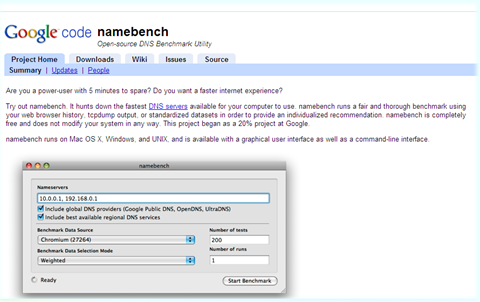

Not sure how? Then view this Google page, replacing its server IP addresses with the ones that namebench recommends. There are a lot of DNS, but the most popular are maybe these: Google. You'll still have to change your DNS server settings manually, unfortunately. Go make a coffee or something, give the program the 10 or 15 minutes it needs, then come back and admire the finished report: detailed charts and graphs that tell you exactly how fast each server is, and recommend the two that you need to use.
NAMEBENCH GOOGLE PC
You should stop using your PC while the benchmark is running, just to ensure that you don't skew the results. (via Download Squad) Tags: dns, dns benchmark, dns-server, google public dns, namebench, nameserver Related posts.
NAMEBENCH GOOGLE CODE
Click "Start Benchmark" and namebench will extract 200 recent URLs from your browser history, then query several DNS servers for each one. Namebench can be downloaded from it’s Google Code project page. Google Code offered open-source project hosting. You can learn more about the data served from Google Cloud Storage here.
NAMEBENCH GOOGLE ARCHIVE
This archive contains over 1.4 million projects, 1.5 million downloads, and 12.6 million issues. To get started, launch the program and choose your most commonly used browser in the Benchmark Data Source list. The Google Code Archive contains the data found on the Google Code Project Hosting Service, which was turned down in early 2016. There are plenty of public alternatives around, and namebench can help you find out whether any of these would improve your surfing speeds. NameBench, Speed up your internet by alot, for windows xp/7 32/64 bitDownload link. You don't have to use the DNS server provided by your ISP, though.

DNS lookups normally take a fraction of a second, but slow servers might take 3, 4, 5 seconds or more to return any information for some sites, and that can quickly become very frustrating. But another possibility is that your DNS server (the computer that translates a domain like into an IP address like 209.85.229.147) is just slow. The delay might be down to the remote site. The test starts to run and you’ll see the queries it’s running through. How Does Namebench Work Namebench runs a. It hunts down the fastestDNS Servers available for your computer to use. Include the global DNS providers and the best available regional DNS server, then start the Benchmark. (As Google always does) Try out Namebench. In this example we’re behind a router and using the DNS server from the ISP. It happens all the time: you type a URL into your browser address bar, hit enter, and there's a long pause before anything happens. Namebench starts up and will include the current DNS server you have configured on your system.


 0 kommentar(er)
0 kommentar(er)
